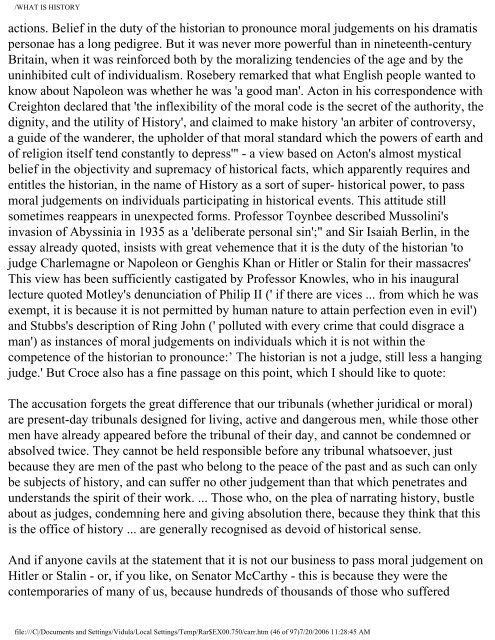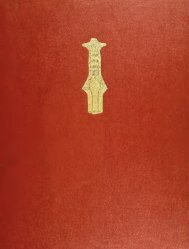What is History / by Edward Hallett Carr - Universal History Library
What is History / by Edward Hallett Carr - Universal History Library
What is History / by Edward Hallett Carr - Universal History Library
Create successful ePaper yourself
Turn your PDF publications into a flip-book with our unique Google optimized e-Paper software.
WHAT IS HISTORY<br />
actions. Belief in the duty of the h<strong>is</strong>torian to pronounce moral judgements on h<strong>is</strong> dramat<strong>is</strong><br />
personae has a long pedigree. But it was never more powerful than in nineteenth-century<br />
Britain, when it was reinforced both <strong>by</strong> the moralizing tendencies of the age and <strong>by</strong> the<br />
uninhibited cult of individual<strong>is</strong>m. Rosebery remarked that what Engl<strong>is</strong>h people wanted to<br />
know about Napoleon was whether he was 'a good man'. Acton in h<strong>is</strong> correspondence with<br />
Creighton declared that 'the inflexibility of the moral code <strong>is</strong> the secret of the authority, the<br />
dignity, and the utility of H<strong>is</strong>tory', and claimed to make h<strong>is</strong>tory 'an arbiter of controversy,<br />
a guide of the wanderer, the upholder of that moral standard which the powers of earth and<br />
of religion itself tend constantly to depress'" - a view based on Acton's almost mystical<br />
belief in the objectivity and supremacy of h<strong>is</strong>torical facts, which apparently requires and<br />
entitles the h<strong>is</strong>torian, in the name of H<strong>is</strong>tory as a sort of super- h<strong>is</strong>torical power, to pass<br />
moral judgements on individuals participating in h<strong>is</strong>torical events. Th<strong>is</strong> attitude still<br />
sometimes reappears in unexpected forms. Professor Toynbee described Mussolini's<br />
invasion of A<strong>by</strong>ssinia in 1935 as a 'deliberate personal sin';" and Sir Isaiah Berlin, in the<br />
essay already quoted, ins<strong>is</strong>ts with great vehemence that it <strong>is</strong> the duty of the h<strong>is</strong>torian 'to<br />
judge Charlemagne or Napoleon or Gengh<strong>is</strong> Khan or Hitler or Stalin for their massacres'<br />
Th<strong>is</strong> view has been sufficiently castigated <strong>by</strong> Professor Knowles, who in h<strong>is</strong> inaugural<br />
lecture quoted Motley's denunciation of Philip II (' if there are vices ... from which he was<br />
exempt, it <strong>is</strong> because it <strong>is</strong> not permitted <strong>by</strong> human nature to attain perfection even in evil')<br />
and Stubbs's description of Ring John (' polluted with every crime that could d<strong>is</strong>grace a<br />
man') as instances of moral judgements on individuals which it <strong>is</strong> not within the<br />
competence of the h<strong>is</strong>torian to pronounce:’ The h<strong>is</strong>torian <strong>is</strong> not a judge, still less a hanging<br />
judge.' But Croce also has a fine passage on th<strong>is</strong> point, which I should like to quote:<br />
The accusation forgets the great difference that our tribunals (whether juridical or moral)<br />
are present-day tribunals designed for living, active and dangerous men, while those other<br />
men have already appeared before the tribunal of their day, and cannot be condemned or<br />
absolved twice. They cannot be held responsible before any tribunal whatsoever, just<br />
because they are men of the past who belong to the peace of the past and as such can only<br />
be subjects of h<strong>is</strong>tory, and can suffer no other judgement than that which penetrates and<br />
understands the spirit of their work. ... Those who, on the plea of narrating h<strong>is</strong>tory, bustle<br />
about as judges, condemning here and giving absolution there, because they think that th<strong>is</strong><br />
<strong>is</strong> the office of h<strong>is</strong>tory ... are generally recogn<strong>is</strong>ed as devoid of h<strong>is</strong>torical sense.<br />
And if anyone cavils at the statement that it <strong>is</strong> not our business to pass moral judgement on<br />
Hitler or Stalin - or, if you like, on Senator McCarthy - th<strong>is</strong> <strong>is</strong> because they were the<br />
contemporaries of many of us, because hundreds of thousands of those who suffered<br />
file:///C|/Documents and Settings/Vidula/Local Settings/Temp/Rar$EX00.750/carr.htm (46 of 97)7/20/2006 11:28:45 AM







